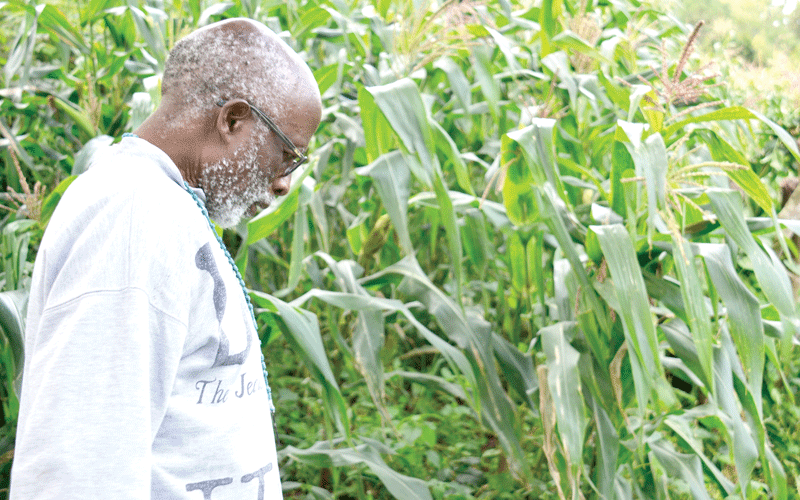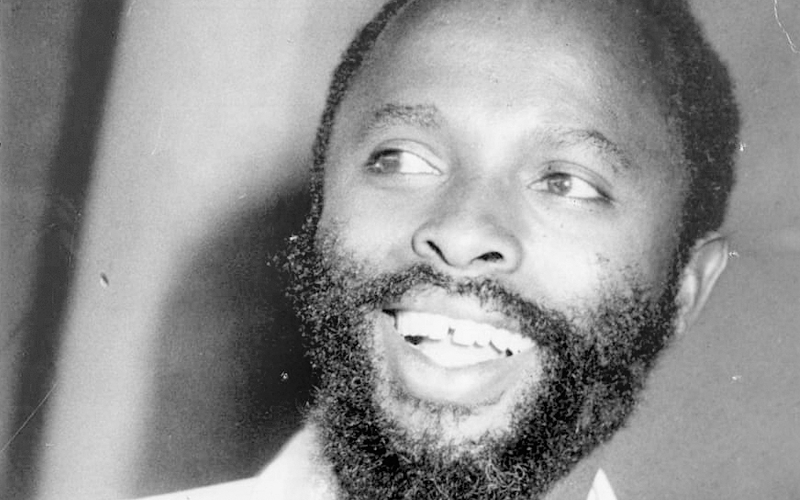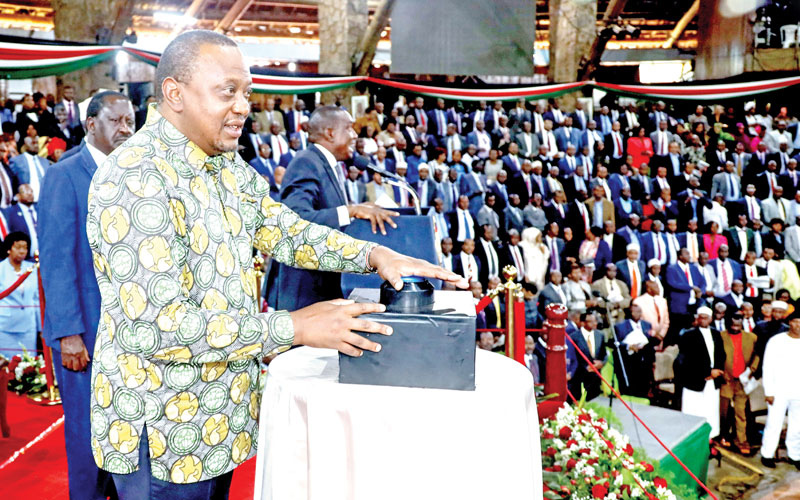Mwachofi: Fiery politician who nearly lost family to save a country

Special Correspondent
We are barely three weeks into 2020 and the year is already promising to be a lively one.
Abroad, Miguna Miguna is kicking up a storm in Germany; Prince Harry and his wife Meghan Markle are leaving the Queen’s palace and the world narrowly escaped a damaging war courtesy of Donald Trump.
Closer home, the Building Bridges Initiative (BBI) campaigns are hotting up, locust have landed and Mwangi Kiunjuri has just been fired as Agriculture Cabinet Secretary.
However, in the lush hills of Mwanda, Taita Taveta county, one man is cruising through his sunset years unbothered by such happenings—he has more pressing problems.
“Monkeys! They are destroying my maize!” says Mwashengu wa Mwachofi, pointing at a nearby forest where his tormentors retreat after their mission.
Spending days chasing cheeky monkeys from his one-acre farm with a catapult might appear mundane to most people, but not to the 78-year-old veteran politician. If anything, it is a continuation of his hands-on approach to solving problems since his youth.
Mwachofi is not your ordinary senior citizen. His avuncular nature has earned him the name Mzee Daudi from neighbours.
He still radiates the fire-brand forcefulness of his youth that electrified the masses and propelled him, then a political greenhorn, to win the Wundanyi parliamentary seat in 1979.
Phenomenal intellect
Born in September 12, 1942, Mwachofi is the fourth born in a family of 14. His siblings include former acting Central Bank of Kenya governor Jacinta Mwatela.
His early life was defined by farm work which inculcated in him a lasting love for honest labour. 
The toil and simplicity of life of the rural folk triggered a burning desire in him to bring a change in their lives.
At 78, he retains a phenomenal intellect and can effortlessly remember fine details from over half a century ago, with startling clarity. With his dry charm and quirky sense of humour, Mwachofi remains a fascinating subject.
His life is a long spell-binding rainbow of defiant impulsiveness, raw ambition and youthful adventurism; all interspersed with periods of great triumph and personal regrets.
His friends refer to him as their “son who dined with kings but never lost the common touch”.
Defiance is his middle name. At the age of six, he defied his father and reported to Class One at Mwanda Catholic primary school dressed only in a baggy shirt that fell to his knees.
“He did not buy uniform for me because he wanted me to repeat nursery. But I was ready for Class One,” he says matter-of-factly.
Stunned teachers would teasingly call him “the boy who wears a skirt”. However, when he emerged top of his class, his father took him to a tailor for a proper uniform.
“He carried me shoulder-high and showed me off to his friends,” he says and chuckles.
In an eerie pre-echo of his future life, challenges followed him to St Mary’s Lushangonyi where he went for his intermediate studies.
He would walk for over 15km daily as his father could not afford boarding fees for his two sons.
At the school, his passion for the Catholic Church blossomed after meeting his first African Catholic priest, Fr Maurice Otunga. The priest, who would later become a cardinal, inspired the young Mwachofi so much that he vowed to become a priest.
“It was a powerful encounter. We never dreamt an African could be a priest. Most of us vowed to become priests,” he says.
Mwachofi’s passion to join priesthood landed him at the Our Queen of Apostle Seminary in Kiserian, Kajiado county, where he met, among others, George Saitoti and President Uhuru Kenyatta’s uncle George Muhoho. Saitoti would rise to become Kenya’s vice-president.
Unlike Muhoho, Mwachofi never became a priest as his true calling was in politics. However, he remains a religious man who never misses a Sunday mass at Our Lady Queen of Peace in Voi town.
Untrained teacher
Three months after joining Form One in 1958, he dropped out because of lack of fees and took up farming for two years before landing a job as untrained teacher.
In 1963, he formally trained as a teacher and was among the first crop to be employed by the newly-formed Teachers Service Commission.
He taught for seven years before quitting in 1971 to join the Prisons department, where he trained at Langata as a cadet officer. 
He served in Kisumu, Kakamega and Murang’a as chief officer for three years before quitting in 1974 to pursue a degree in sociology from the University of Nairobi.
“I had been studying as I worked and completed my A-levels. The University of Nairobi offered me a slot to study sociology,” he says.
In 1979, while conducting research for his masters degree project in his home village, Mwachofi developed interest in politics.
“I left my research work and jumped into the campaigns. It was a mere rehearsal but I was shocked after winning against Kanu kingpins like Dawson Mwanyumba and Juxton Shako.”
He attributed his victory to his unorthodox campaign methods, including door-to-door visits that endeared him to voters.
Once in Parliament, his reputation as a defender of the peoples’ rights reached far and wide.
His firebrand politics soon caught the attention of Charles Njonjo, the then Attorney General and President Moi’s right hand man.
“Njonjo labelled me ‘Karl Marx’ the chief ideologue,” he reveals.
Mwachofi would then team up with a group of like-minded youthful lawmakers whom Njonjo christened the Seven Bearded Sisters.
They were Abuya Abuya (Kitutu East), Onyango Midika (Nyando now Muhoroni), James Orengo (Ugenya), Lawrence Sifuna (Bumula), Chibule wa Tsuma (Kaloleni) and Koigi wa Wamwere (Nakuru North, now Subukia).
Mwachofi says they were defenders of the people against Kanu’s excesses.
His first term ended abruptly after Moi dissolved Parliament after the abortive 1982 coup.
The Kanu government was keen to ensure he did not go back to Parliament and hoped the electorate would reject the young MP.
But when the results came in, Mwachofi had won again against government-funded rivals.
In his second term, his bashing of Kanu intensified largely because he had become a member of the Public Accounts Committee (PAC) together with Mau Mau veteran Gitu wa Kahengeri and Kijana Wamalwa.
Mwachofi says they did a stellar job though they had some distrust for Wamalwa, who was greatly admired by Njonjo because both spoke flawless English. 
“Njonjo had a soft spot for Wamalwa and called him Mike because they both spoke impeccable Queen’s English.
We sometimes wondered if Wamalwa would not leak our secrets to Njonjo,” he reveals.
One of his greatest contributions was on land issues in Taita Taveta, where he called for a review of the land distribution system which was skewed against local residents. His motion was so incendiary that the government, through Njonjo, opposed it.
Local MPs including the then Voi legislator Eliud Mwamunga, a Kanu minister, and Taveta MP Mwacharo Kubo, an assistant minister, voted against the motion.
“My motion was defeated but at least we knew who had the people’s interests in their hearts,” he says.
Mwachofi left Parliament in 1988 after being locked out of the party nominations by Kanu wheeler-dealers.
His attempt to spring back to politics was ruined by President Mwai Kibaki, whom he accuses of funding Chirau Ali Mwakwere to orchestrate an internal coup in the Shirikisho Party of Kenya where Mwachofi was national chair.
Mwachofi says that time he was away tending to his ailing father when the “coup” happened.
“How could Mwakwere lead my party into a coalition with PNU, of all parties?” he poses with a sense of indignation.
However, underneath the fame, deep pain lurks. Mwachofi remains a man haunted by crippling regrets over what he terms as neglecting his family to take up national duties.
“My fight for a better Kenya robbed me of an opportunity to become a proper father for my children,” he says.
In a heart-wrenching admission, he agrees he was never “properly” there for his children when they needed him most.
It is Macelina Mwachofi, his wife of 51 years, who gives a candid insight into the life of a family governed by fear for their lives and a husband tormented by ruthless Special Branch operatives in the Kanu era.
Proper father
“We always lived in fear. We never knew if he would return home alive. He provided everything but the children needed their father who was not there,” she says.
Mwachofi agrees he was emotionally absent for his children.
“I was never there. That remains my greatest regret. I have asked God for forgiveness for not being a good father for them.
By the time I realised what politics had taken away, my children were grown up and I was a stranger to them,” he mumbles sadly.
Though he says it’s impossible to rewind time, he plans to spend his remaining days reviving and strengthening ties with his children. In old age, he hopes to be the father he could not be in his youth.
He feels, too, that some members of the “Bearded Sisters” team betrayed their ideals. He singles out Orengo whom he describes as a changed man after becoming a high-flying politician and minister under Kibaki.
“It was Abuya Abuya and I who planned Orengo’s escape to exile when he was being hunted down by the Kanu regime.
He called to tell me he had arrived safely in Uganda, but he is a changed man now. He never calls, too.”
Mwachofi is currently writing his autobiography in which he intends to put his thoughts and dreams into words.







